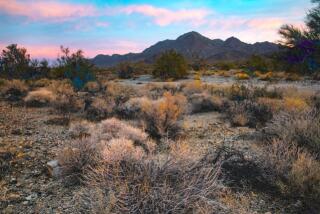Court Protects High Country Sacred to Indians
- Share via
Indians may continue their religious and medicinal ceremonies in the high country of California’s Siskiyou Mountains without interference from road building and logging operations, a federal appeals court has ruled.
The U.S. 9th Circuit Court of Appeals cited First Amendment protections for freedom of religion and, in a decision released Monday, banned road building and logging on 26,000 acres of land held sacred by Indians in the Six Rivers National Forest in Del Norte and Humboldt counties.
The court also prohibited logging on 50,500 more acres in the national forest until the U.S. Forest Service conducts further environmental studies. The land includes the watershed of Blue Creek, which flows into the Klamath River.
“This decision is an important step in protecting Indian religious practices,” said Marilyn Miles, a California Indian Legal Services attorney who represented the tribes.
“Not only Indians, but the general public loses the less religious diversity there is. This is the first of five such cases in the nation to succeed, and it will have a nationwide impact.”
The Forest Service had approved an 80-year logging plan for the forest that included construction of a six-mile road through sacred Indian land. When U.S. District Judge Stanley Weigel in San Francisco prohibited building the road and conducting logging operations in the area, the Forest Service appealed.
Writing for a three-member appeals court panel, Judge William Canby upheld Weigel’s finding that logging would violate the Indians’ First Amendment right to the free exercise of their religion.
Weigel had decided that “for generations, individual members, spiritual leaders and medicine persons of the Yurok, Karok and Tolowa tribes have traveled to the high country to communicate with the ‘great creator,’ to perform rituals and to prepare for specific religious and medicinal ceremonies.”
The high country’s “pristine environment” and “opportunity for solitude” made communicating with the “great creator” possible there, the judge wrote, adding that building roads and harvesting timber “would seriously damage” the area’s environmental quality.
In his decision, Weigel cited a Forest Service study that concluded that “intrusions on the sanctity of the Blue Creek high country are . . . potentially destructive of the very core of Northwest (Indian) religious beliefs and practices.”
The federal California Wilderness Act adopted last year also prohibited logging and road building on much of the 26,000 acres where the appeals court banned such activity, but the law left open a corridor for a road, Miles said. Monday’s appeals court ruling closes that corridor.
Attorneys for the Forest Service could not be reached for comment.
More to Read
Sign up for Essential California
The most important California stories and recommendations in your inbox every morning.
You may occasionally receive promotional content from the Los Angeles Times.









